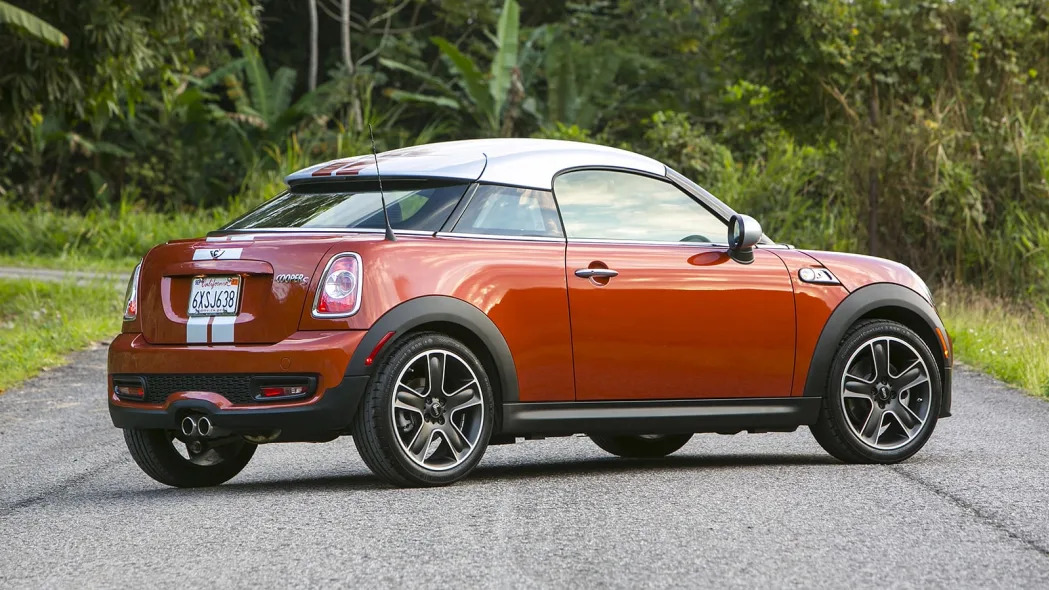Dumb cars that are actually cool

The world has seen more than it’s fair share of bad cars. Cars that break down (the Oldsmobile diesel experiment comes to mind), rust to nothingness (seemingly every Italian car sold in the 1980s), were sales flops (the Ford Edsel) or became rolling jokes (the Pontiac Aztek, which in retrospect may have just been too far ahead of its time). Most of them aren’t really worth talking about, and some actually go on to become sort of collectible.
Every once in a while, though, an idea that makes no sense filters through the product-planning cracks and makes it off the drawing board and into the real world, with the result so strange and yet interesting that it moves from the dumb category to the dumb-but-cool category.
These are vehicles that should never have seen the light of day, but we’re glad they did.
1991 GMC Syclone
Let me get this out of the way right off the bat: The GMC Syclone is very, very cool. Its Ferrari-beating performance is legendary, its turbocharged and all-wheel-drive powertrain is heroic, and its looks are menacing. The fact that it’s cool is not up for debate. The original idea, though, was fraught with lunacy. Here was a two-seat pickup truck that couldn’t really haul or tow, was awfully expensive for something wearing a then-plebeian GMC badge (remember, this was well before the chrome-dunked Denali) and kinda sorta sounded like it was ready to fall apart on rough roads. The Typhoon that came later offered significantly more practicality.
None of that matters today. The GMC Syclone is a perfect example of an idea that made very little sense on paper or, really, even in the real world, but was still so impressive a package that it stands out even today as a trend-setter for forced induction and high-performance pickup trucks. — Consumer Editor Jeremy Korzeniewski
2009 Chevy HHR SS Panel
The Chevy HHR wasn’t cool, despite the fact that it was designed specifically as an attempt to attract the attention of the styling-first crowd that was initially attracted to the Chrysler PT Cruiser (which is also basically uncool but kinda sorta cool in a few turbocharged guises). But the SS version of the HHR was pretty neat, with up to 260 horsepower in a compact chassis and an available manual transmission with no-lift shift programming. But the version we’re focused on here is the obscure Panel, which started off as a small cargo van aimed at small businesses before Chevy inexplicably decided to offer it in SS trim. Same engine, same suspension upgrades and same sporty detailing as other HHR SS models but with the removal of the rear door handles, glass and seats. Note, the back doors did open, but only from inside.
There’s no reason for it to exist, and, unsurprisingly, it sold terribly. The fact that a few strange souls decided to buy one back in 2009, though, is a cool little footnote in automotive history, and that’s enough to qualify the HHR SS Panel for this list. — Consumer Editor Jeremy Korzeniewski
2006 Jeep Grand Cherokee SRT-8
The late ’90s and early 2000s played host to the first act of America’s performance truck and SUV boom. The four-wheeler horsepower wars heated up as the world charged headlong toward the financial crisis of the late aughts, so when SRT announced it had gotten its hands on the premium-oriented Grand Cherokee, it was met with equal parts contempt and anticipation from an enthusiast community that wasn’t yet largely on the performance SUV bandwagon. And here’s the thing: It was good. It was a complete package in a way other SRT models were not. Remember, those early SRT8s had the 6.1-liter Hemi and an open differential. It wasn’t until the second year of the Challenger’s life cycle (2009) that a limited-slip option showed up. In that context, the Grand Cherokee’s standard four-wheel drive was a game-changer.
Sure, it was compromised in some of its daily SUV duties (towing, in particular), but not nearly so neutered as the manual-transmission Dodge Ram SRT-10, and unlike the Viper-powered pickup, the Grand Cherokee SRT8 was not only quicker and better-polished than anything else with an SRT badge, but still a perfectly tame and all-weather-friendly daily driver. — Associate Editor Byron Hurd
2013 Mini Cooper Coupe
After several years of success with the regular Mini Cooper hatchback and convertible, Mini decided it needed to expand its lineup. And while its expansion gave us the still popular and reasonably practical Countryman, it also gave us some pretty bizarre models, too. Probably the strangest, but also most distinctive and cool was the Coupe. It’s bizarre in sort of the same way that its Roadster compatriot was: Mini took an already small and arguably impractical car, and then made it less practical. It lost the rear seats, and the lowered roofline removed some of the maximum cargo space. And it didn’t have any substantial performance benefit over the more practical versions. But the Coupe in particular got one wild-looking roofline. It was apparently inspired by a backwards baseball cap, and for once we agreed with the designers. It seemed like kind of a dumb design idea, but it looked kind of cool in the end.
It’s certain to turn heads now, too. And while it’s not really any better than the regular Minis, it’s still a Mini, so it’s still lots of fun to drive. The coupe’s liftback means not all the practicality is gone, too. The Roadster is an option for those who like droptops, but it’s even less practical, and dropping the top removes some of its distinctiveness. – News Editor Joel Stocksdale
2017 Range Rover Evoque Convertible
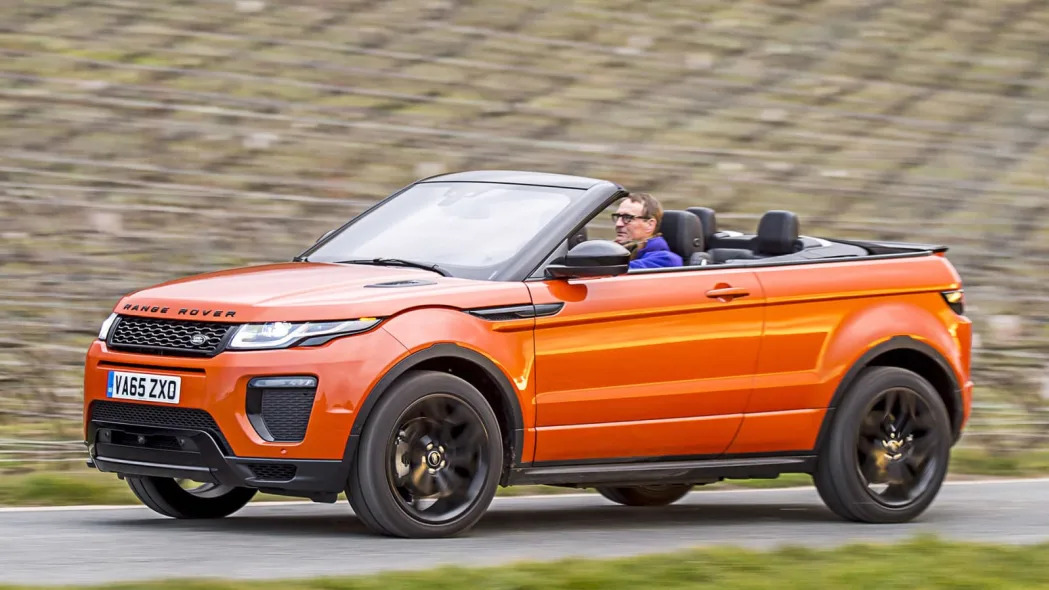
It’s hard to get much dumber than a crossover convertible. The one cited most in this category of cars is the Murano CrossCabriolet, but that particular example isn’t particularly cool. The Range Rover Evoque Convertible on the other hand, now that’s cool. It’s still properly dumb to fit our theme; who wants a lifted crossover with next to no cargo space and only two doors? But the execution of the Evoque Convertible lifts it into the realm of cool.
The main thing going for the Evoque Convertible is its design and finer styling points. It’s an impossibly clean and finished-looking convertible. There’s no awkward humpback or strange body kick-up at the rear. It’s crisp and purposeful, almost as if Land Rover designers had this model in mind when designing the regular four-door Evoque. Unlike the Murano, the Evoque even looks good with its top up! It also has all the luxurious amenities and off-road ability (limited, it may be) that the regular Evoque does, making it a proper Land Rover product. Somehow, Land Rover managed to stick the landing with this totally mad idea. – Road Test Editor Zac Palmer
GMC Envoy XUV
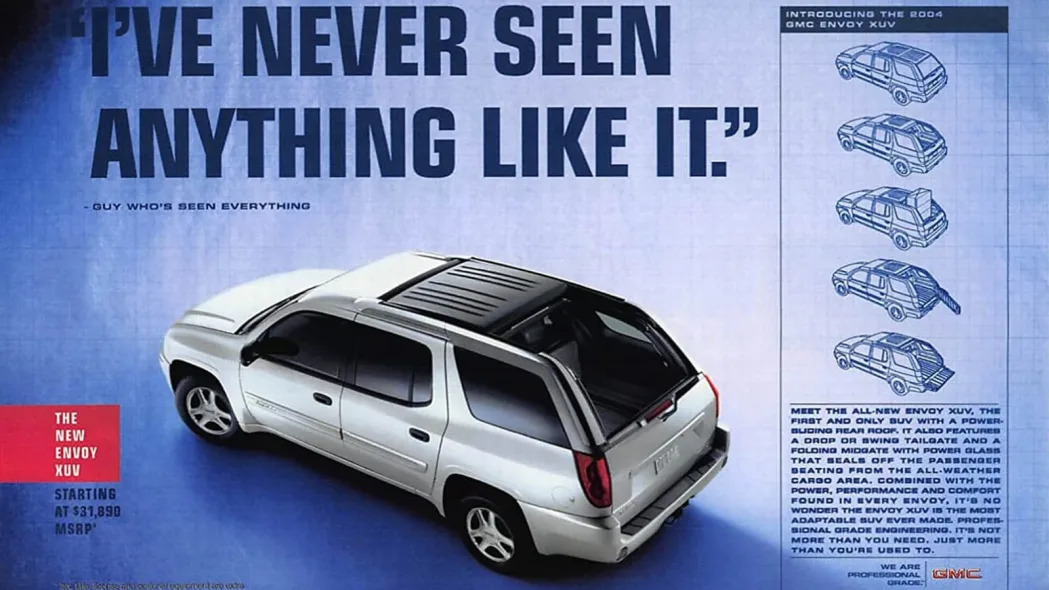
As the above description says, the Envoy XUV was “the first and only SUV with a power-sliding rear roof. It also features a drop or swing tailgate and a folding midgate with power glass that seals off the passenger seating from the all-weather cargo area.” That’s a really long-winded description, but I challenge you to describe this bonkers Rube Goldberg creation in any fewer words. Indeed, the Envoy XUV proved to be awfully dumb, but if I asked someone what kind of car they drove and they answered “GMC Envoy XUV,” I would instinctually say “What? Seriously? That’s awesome!” And then I’d ask with befuddlement “why?” as I kept the next part of “because that thing was ridiculous” in my head. – Senior Editor James Riswick
2002 BMW M Coupe
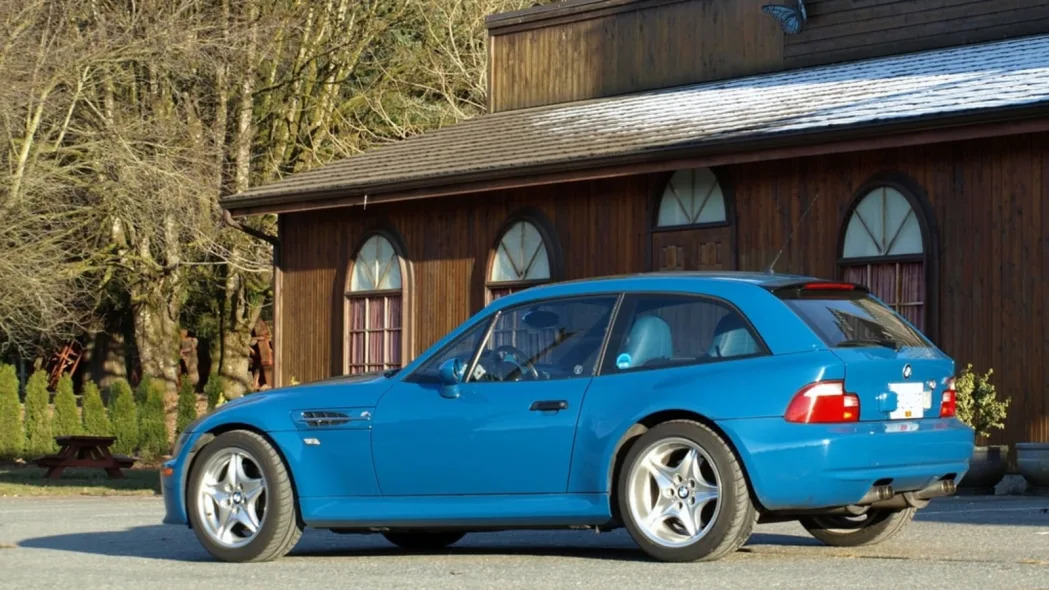
The BMW Z3 was designed to be a pretty little roadster cheaply thrown together with bits and pieces from the BMW parts bin. It originally only had a 138-horsepower 1.9-liter inline-four engine, that has forever been described by “weedy” even in places where that isn’t even a common adjective. Then, wisely, BMW put a 2.8-liter inline-six good for 189 hp and 203 pound-feet of torque. Its 0-60 time of 6.3 seconds was awfully quick for the time, and actually still feels pretty quick today. I know because I own one. I also know that the Z3 has the structural rigidity of cooked spaghetti, shimmying like Shakira over every bump. To correct this, and to make the Z3 a more credible performance car with sufficient rigidity, BMW effectively married the pretty little roadster to a Honda Civic Hatchback and came up with the BMW M Coupe. It was the reverse mullet: party in the front, business in the back.
At the time, people were aghast at what was dubbed the “clown shoe” and definitely said such things as “that’s so dumb.” Yeah, but dumb in a totally awesome way. Like doing doughnuts in a parking lot is dumb, which is basically the prime activity for one of these. And it would get even dumber and awesomer. While the original 240-horsepower M Coupe represented a clear performance upgrade over the 2.8-liter, BMW brought a minigun to a knife fight when the M Coupe received the then-new BMW M3’s S54 inline-six that produced 315 horsepower (down 18 from the M3). To make the math clear, it not only had 75 more horses than before but 177 more than the Z3 had originally. Anything described as “overkill” is also probably pretty dumb, but as is often the case with overkill, the 2002 BMW M Coupe is also one of the most awesome cars ever. – Senior Editor James Riswick
2002 Lincoln Blackwood
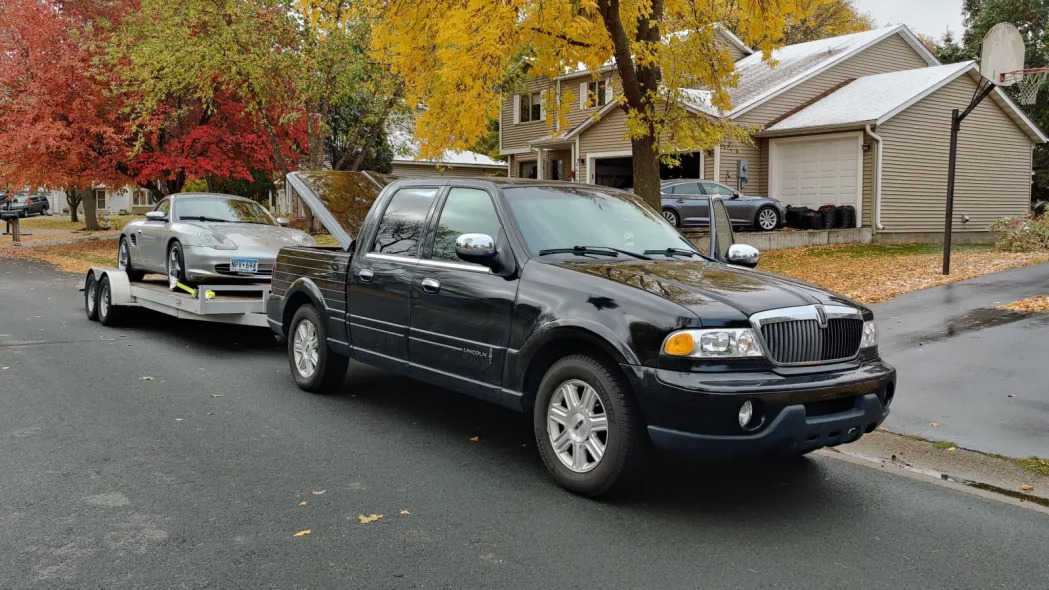
I don’t think there’s much debate about if the Lincoln Blackwood was a good or a bad idea from Ford and Lincoln at this point. It was a sales flop in a very bad way and only lasted one model year due to low demand. That said, I think the Blackwood carries a worse reputation than it deserves, and despite some of its poorer qualities, is still an exceedingly cool vehicle. Lincoln was a little too early to the luxury pickup party, and the execution of some vital parts of the truck left much to be desired, but when you look at feature-filled, exorbitantly-priced pickups like the Ram 1500 Tungsten or GMC Sierra Denali Ultimate these days, it kinda looks like Lincoln was onto something with the mega-luxe truck. Lincoln flubbed that idea by hamstringing the truck with a power-operating hard tonneau cover and carpeted bed, essentially turning the “bed” into a glorified trunk that was very long but also very short in height. Four-wheel drive wasn’t even an option either, killing any hopes of off-road capabilities. However, the Blackwood was still a pickup that could tow like one thanks to its DOHC 5.4-liter V8 (8,700-pound max), and it featured lots of fancy tech from the Navigator. The feature list really is something special – in-car nav, self-leveling rear air suspension, heated/cooled seats trimmed in Connolly leather, an LED-lit bed and more. It was genuinely one-of-a-kind back in 2002, and depending on your use case, it can still be a great pickup today (full disclosure: my dad owns one of the 50 Neiman Marcus Edition trucks, pictured above doing Real Truck Work, so I’m speaking from actual seat time in one). – Road Test Editor Zac Palmer
2011 Nissan Murano CrossCabriolet
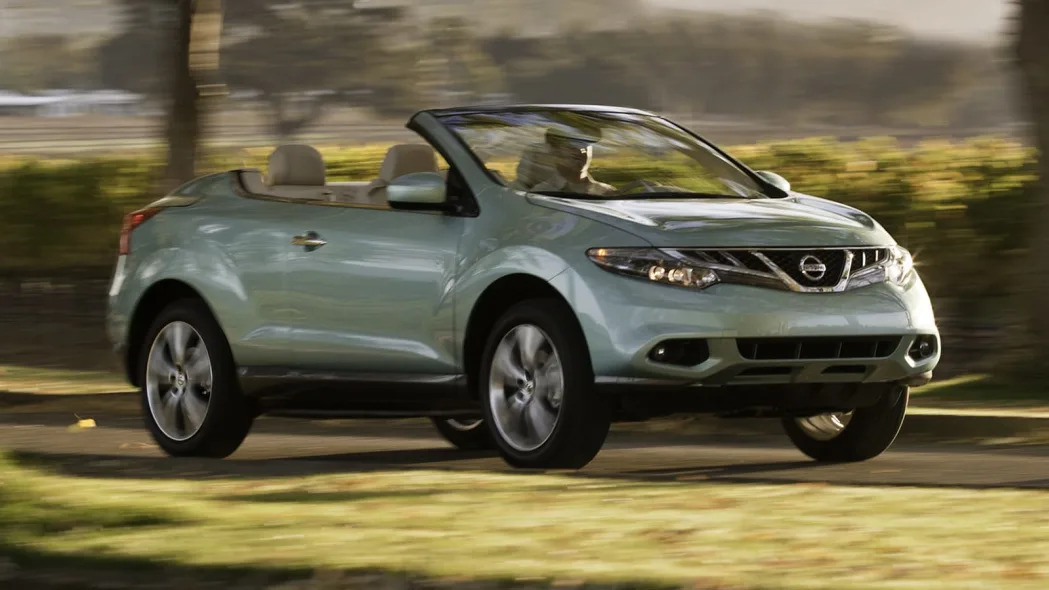
This list wouldn’t be complete without the Murano CrossCabriolet. It’s pretty much the first stab at turning a more car-like crossover into a convertible (rather than the truck-based SUVs like Blazer, Bronco, Jeep CJ and Scout that were all convertibles from the start). And it was about as practical, logical and successful as those that followed, like the Evoque convertible we already covered.
The Murano has a number of factors that add to its bizarreness. For one thing, there wasn’t a two-door version to chop the roof off, so that added some extra complication to the development. It got a weird bonus glass panel in the top above the main rear one, which Nissan said was supposed to help the cabin feel airy-er. It was also an idea that made it to production with help from former CEO Carlos Ghosn. There have been rumors that it was done partly for his wife.
Of course, turning a relatively practical four-door crossover into something with a little more than 12 cubic feet of cargo space with the top up, and just over 7 with it down, while being heavier and more flexible seems pretty terrible. But on the other hand, because of the size, the CrossCabriolet actually has rear seats usable by adults, so everyone can join in on the open-air fun. And if you just want a convertible with some usability, and don’t care so much about other driving aspects, why not start with a crossover? There have been plenty of very average-driving convertibles that weren’t, like the Chrysler Sebring and Buick Cascada. This one just was weirder. – News Editor Joel Stocksdale
2007 Mercedes-Benz R 63 AMG
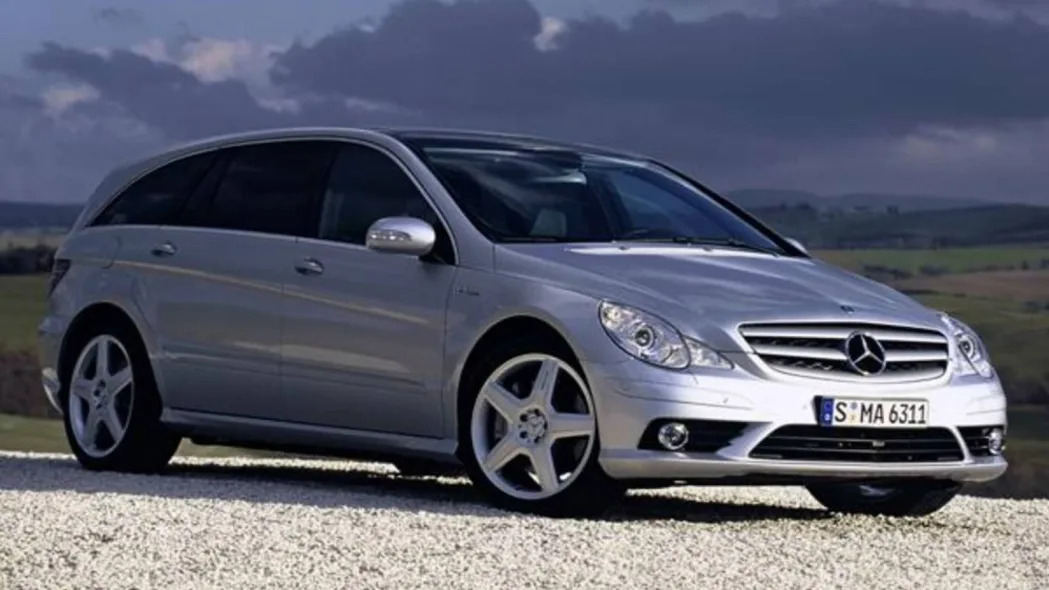
I’d say that my age is showing by thinking a Mercedes minivan is cool, except for the fact that I ogled every R-Class that passed me by back when I was in my mid-20s. And, sure, you could get a diesel engine, which was cool, but the real prize was the rare R 63 AMG, with its naturally aspirated 6.2-liter V8 making 503 horsepower and 465 pound-feet of torque. No, it wouldn’t tackle corners like the rest of its Affalterbach stablemates, but it would make for really fast trips to soccer practice — something I could appreciate more now than back in 2007.
In addition to the extra horsepower under the hood, the R 63 featured Mercedes’ 4Matic all-wheel drive, sport exhaust, upgraded brakes and height-adjustable air suspension. It featured a slew of unique-to-AMG exterior touches, as well as a swank interior with leather AMG sport seats with Alcantara inserts. There was even a standard “RACETIMER” that could record and save lap times. I wonder how often that feature got used. – Senior Editor John Beltz Snyder
